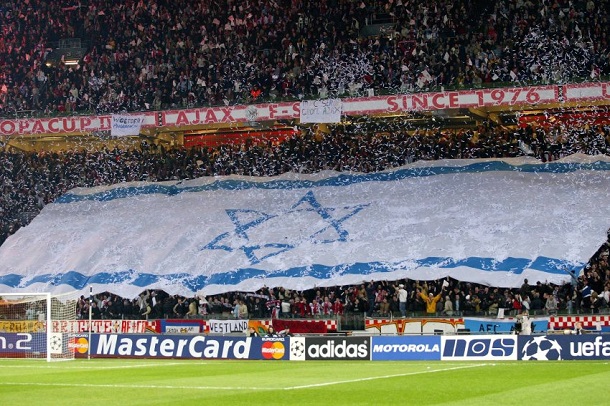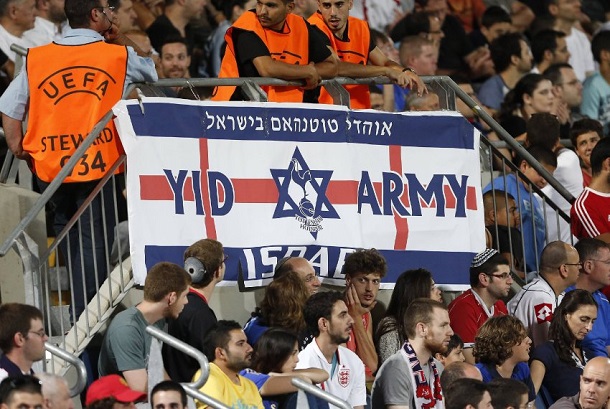They call themselves the “Yid Army” and “Super Jews”: For decades, the fans of Tottenham Hotspur and Ajax maintain a Jewish identity, although the clubs have a Jewish origin. Not everyone agrees with the symbolism on the terraces.
During Sunday’s home game against West Ham United, they will be heard again: the songs that would banish the English Football Association from the stadium of Tottenham Hotspur. “Yid Army”, call the fans at White Hart Lane in north London. The association they have stated that they will not be dictated by which songs they have to support their team – or: what not to. “We sing what we want!”, It sounded played against Chelsea in the choir of the stadium.
The FA had issued a warning to early September Tottenham fans, after which the use of the term “Yid” could be construed as a future crime and punished with stadium bans, since it represents an insult to Jews. The fans please refrain from the expression. But the concern of the Association has gone unheeded, as was shown against Chelsea.
Because first are difficult to prohibit traditional practices in fan sections. And secondly refer Tottenham’s followers that they should not be understood as anti-Semitism their songs – on the contrary. “We sing with pride, as a sign of our identity,” says James Mariner, for ten years season ticket holders at White Hart Lane.
Tottenham fans actually maintain a Jewish identity. The Israeli flag is a familiar sight on the sidelines. The same phenomenon can be viewed at the Dutch giants Ajax Amsterdam. The fans call themselves and their club as “super Jews”, and they sing, for example: “. Whoever does not jump, which is not a Jew” Some fans have tattooed the Star of David.
Ajax Amsterdam, the “Jerusalem of the West”
Here are the “Spurs” and Ajax no Jewish clubs. The number of Jewish fans is not above average at both clubs. Where does the Jewish symbolism?
In the case of Ajax’s image as a Jewish club has to do with the fact that Amsterdam was considered a “Jerusalem of the West” before the Second World War. About 80,000 Jews are said to have lived in the city at that time, actually many Ajax fans. The stadium De Meer, in the Ajax in the nineties fought out its home games until the construction of the modern arena, lay to the east of the city, where a large part of Amsterdam’s Jewish population lived.
“When Ajax played against teams from more provincial regions, the away fans had to drive the train station by tram to the stadium. They drove through the Jewish quarter. So many people saw for the first time in her life Jews,” says Hans Knoop, Jewish journalist and spokesperson for a foundation that is committed to combating anti-Semitism in Dutch football.
Hooligan group attacked Jewish image on
After the Second World War had Ajax symbolic figures, the Jews were: President Jaap van Prague, whose son, Michael, Uri Coronel, he President. In the great Ajax teams of the late sixties and early seventies were playing with Bennie Muller and Sjaak Swaart two Jews. In addition, popular with fans and players alike masseur Salo Muller was a Jew.
In the seventies and after that saw Ajax in the domestic league repeatedly exposed to anti-Semitic hostility. In order to fight back against the slogans that was founded in 1976 hooligan Group F side took the Jewish image on demonstrative. The group is still active today. To solidarity with Israel and Judaism it is not loud but it Knoop Foundation spokesman: “90 percent of the Ajax fans do not even know where Israel is when they ‘Jews, Jews!’. or ‘Super Jew!’ call, they aim to cheer on their team – nothing more. ”
Opposing fan groups react with new anti-Semitism on the Jewish identity of the Ajax fans. “Hamas! Hamas! Jews to the gas”, supporters of Feyenoord call regularly in games against Ajax. Lex Immer Ado Den Haag in 2011 was suspended for five games because he had struck up a favorite among fans of his club song after a win against Ajax: “We’re going to hunt for Jews!” Knoop says: “The opposing fans are not necessarily anti-Semitic, but they are against Ajax Ajax And when the Jews are, they must be flat against the
The “Tottenham Hotspur” were popular with Jewish immigrants in London
Tottenham Hotspur is for similar reasons connected with Judaism as Ajax. The club from the north London was popular among Jewish immigrants in the late 19th and early 20 Century settled in London’s East End. “The Spurs were then glamorous than the nearer West Ham United and Arsenal as” says Anthony Clavane . The Jewish journalist of the “Daily Mirror” has just published a book that deals with Jewish influences in English football. Traditionally in North London districts such as Barnet, Hackney and Harrow home to many Jews. So Tottenham Hotspur became the appropriate image.
As the fans of Ajax were anti-Semitic insults in the seventies and eighties Tottenham supporters. At that time, the English football had a massive violence and racism problem. In their defense to Tottenham fans made the insults to own. Since then, they call themselves “Yid Army” – and also see anti-Semitic hostility exposed. Opposing fans imitate against Tottenham sometimes hissing sound of gas chambers. In November supporters were attacked from London before a Europa League game in Rome of fascist Lazio fans.
Clavane author hopes that Tottenham fans continue to give their songs. Especially with the “Y-word”, as he says he has problems. Because the term “Yid” is considered discriminatory. He was coined in the thirties by the party of fascist Oswald Mosley.
In it the main difference between the Jewish symbolism is at Ajax and Tottenham: During the Amsterdam fans refer to themselves and their club as “Jews” and “Super Jews” use Tottenham’s followers a defamatory term that with the end of racism problems in England actually from the stages of the Premier League was gone. “Most people know that we mean it as pure fun. We want to offend anyone,” said season ticket holder James Mariner.
According to Anthony Clavane makes things any better: “Should it be allowed to sing songs in which a word occurs that offends a minority,” he asks. It’s a rhetorical question.
[adrotate banner=”46″]

 The Royal Mile is becoming increasingly dangerous
The Royal Mile is becoming increasingly dangerous Netanyahu’s Residence Targeted in Another Attack
Netanyahu’s Residence Targeted in Another Attack Russia Halts Gas Supplies to Austria, Marking a Shift in European Energy Relations
Russia Halts Gas Supplies to Austria, Marking a Shift in European Energy Relations Scholz speaks to Putin on the phone for the first time in two years
Scholz speaks to Putin on the phone for the first time in two years